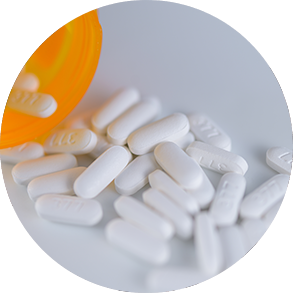Opiates are a group of highly addictive drugs that are naturally derived from the opium plant. They have traditionally been used to treat pain and include morphine, codeine, and heroin. While some people take these drugs responsibly to relieve pain, many opiates can be abused, and more and more people have started to abuse them. As the addiction grows stronger, treatment is needed to recover. Fortunately, the opiate treatment centers at Banyan’s Chicago drug rehab offer patients everything they need to achieve long-term sobriety.

What is the Opiate Epidemic?
In more recent years, the United States has found itself in the midst of an opiate epidemic. You have probably seen stories on the news that mention the drug crisis or may have watched a loved one struggle with these drugs. In 2017, an estimated 68% of drug overdoses in the United States involved an opioid. This number has drastically increased since the turn of the century.1 With such alarmingly high numbers, it is no wonder this trend has been considered an epidemic.
Illinois has been drastically affected as well. In Cook County alone, opioid-related overdose deaths increased by 16% from 2013 to 2015.2 From 2018 to 2019, it went up another 5% and has quadrupled since 1998.1 2021 saw another spike in deaths caused by opioid overdose, with a total of 3,013 fatalities. This illustrated a 2.3% increase from 2020 and 35.8% from 2019.3 As a drug rehab in Chicago, we have seen the effects of the growing opiate problem, and we want to help.
Classic Signs of Opiate Addiction
If you suspect that your loved one is abusing opiates, you need to be able to recognize it first before you can get them the help they need. Maybe you even take opiates yourself and have begun to recognize that you may have a problem.
Some Common Signs of Opiate Abuse Include:
- Constant cravings for the drugs
- Taking opiates in a way that is not recommended or prescribed
- Lying about the frequency and amount of drug use
- Changes in behavior
- Mood swings
- Weight changes
- Stealing to sustain the addiction
Both prescription and illegal opioids are addictive, and even people who take them as prescribed are at risk of developing a dependence that can progress into an addiction if not checked. If you or a loved one has exhibited any of the signs listed above, there is a major problem, and the help of an opioid abuse treatment center is typically required.
What Is the Difference Between Opiates and Opioids?
Opiates and opioids are frequently used interchangeably, yet they differ significantly in their history and current applications. Opiates specifically refer to naturally occurring compounds like morphine and codeine that are derived from the opium poppy plant. These substances have been used for pain relief for millennia and are distinguished by their capacity to bind to particular receptors in the brain and central nervous system, thereby reducing pain signals. Opiates have a lengthy history of usage in medicine, reaching back to ancient civilizations due to their natural origin. Due to their strong effects, they are nonetheless also linked to a higher risk of addiction and misuse.
Opioids, on the other hand, cover a wider range of drugs, including both naturally occurring opiates and synthetic or semi-synthetic chemicals created to mimic their effects. Strong painkillers like oxycodone, hydrocodone, and fentanyl, which are frequently prescribed for managing severe pain, fall under this group. Opioids, in contrast to opiates, are not only found in nature. They may also be chemically produced. As a result, more precise and potent painkillers have been created, yet some opioids may now be more potent and possibly hazardous than their natural counterparts. In recent years, the term "opioid" has spread to include a wider spectrum of drugs used in contemporary medicine to treat pain.
While opiates and opioids are similar in terms of their addictive qualities and potential for abuse, the methods used to treat them can differ depending on the drug in question, the dosage, and the patient in question. Typically, medically supervised detoxification is part of the first phase of treatment for addiction to both opiates and opioids. This procedure tries to physically stabilize the person while safely managing withdrawal symptoms.
After detoxification, the therapeutic strategy could change a little. For instance, those who are dependent on natural opiates could benefit from drugs like methadone or buprenorphine, which are synthetic opioids that can help control cravings and withdrawal symptoms. For those addicted to synthetic opioids, however, alternative dosages or altered treatment schedules may be used along with similar drugs. Additionally, it is essential to include behavioral therapy, counseling, and support groups in both types of addiction treatment. Regardless of the particular substance at issue, these methods assist people in addressing the psychological, emotional, and social elements of addiction. Luckily, Banyan Chicago is equipped to deal with either scenario, and we can adjust the treatment regimen when necessary to suit the patient's needs.
Our Opioid Rehab in Chicago
At Banyan Chicago, we understand how difficult it can be to watch someone struggle with drug addiction. Treatment at our drug rehab in Chicago is designed to walk patients through the recovery process so that they can come out on the other side happier, healthier, and drug-free.
The first step to overcoming opiate addiction is typically a drug detox to safely wean your body off of the harmful substance. From here, we offer programs to help patients on their journey to stay sober, including our highest level of care, our partial hospitalization program.
During their time at our opiate treatment centers, patients will be exposed to a variety of addiction therapy programs for a comprehensive approach to treating opiate addiction. This programming includes group therapies, SMART recovery, cognitive behavioral therapy, individual therapy sessions with a trained professional, and more.
Our goal is not only to help our patients heal in all of the areas of their lives that their opiate addiction has damaged but also to set them up for long-term success. In the event of a relapse, our stabilization program is there to get the person back on track.
Furthermore, we understand that addiction affects not only the individual but their loved ones, as well, which is why our opiate treatment also includes family therapy for our patient’s friends and family. Spouses, parents, and siblings can work with our counselors privately and in group settings with patients to speak of how they’ve been impacted and work on rebuilding a relationship affected by drug abuse.
Contact Our Opioid Recovery Center Today
Whether you need help for a loved one or help for yourself, take action now. Let our partial or outpatient opioid treatment be the answer to your problem. Contact Banyan Treatment Centers today to learn more about our rehab for opiate addiction in Illinois.
Sources:
- CDC - Opioid Overdose- Understanding the Epidemic
- Cook County Department of Public Health - Overdose Prevention
- IDPH - Statewide Semiannual Opioid Report - May 2022
Other Treatment Options
Most Insurance Plans Accepted
At Banyan Chicago our goal is to make sure that anyone who needs treatment from drug and alcohol addiction are able to get the help needed to assist them on the road to recovery. If you don't have insurance contact us to inquire about alternate methods regarding treatment for yourself or a loved one.














